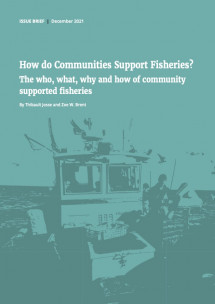Ideas into movement
Boost TNI's work
50 years. Hundreds of social struggles. Countless ideas turned into movement.
Support us as we celebrate our 50th anniversary in 2024.

This brief aims to show that who fishes matters for the future of marine life. It unpacks some of the key differences among fishers and types of fishing, and provides guidance on how to support fishers taking steps towards the positive transformation of the fisheries sector.

Download the full report here.
The EU fishing fleet has become too “efficient”. Facilitated and encouraged by EU policy, capacity enhancements and concentration in the sector have led to a relatively small group of highly industrialised boats which are responsible for the bulk of overfishing and are threatening the livelihoods of the majority of smaller fishers. However, for the non-fishers among us, figuring out how to best support small scale fishing communities, and encourage sustainable fishing practices can be difficult. Industrial fishing companies and fish retailers know that consumers are worried about the state of our oceans and they market to that fear. This kind of green- and blue- washing creates a fog of buzzwords and supposedly sustainable, local, and family-owned options which can be difficult to differentiate from real alternatives.
Scale is not the only factor that distinguishes small-scale and artisanal fishing from large-scale industrial fleets. The different structure of small-scale fishing enterprises also shapes their interests and concerns. Typically fishing trips by small-scale fishers don’t last more than a day and are limited in distance from their home port. Owners of boats also operate their vessels. Thus, the quality of employment at sea and the conditions of local fish stocks - today and into the future - are not abstract concerns for small-scale fishers, but matters of livelihood, culture and family wellbeing. Good business practices in this context are about more than efficiently removing fish from the ocean as quickly as possible. For small-scale fishers, fishing well is about preserving and protecting local environments, livelihoods, and communities.
In the EU small-scale fishers represent some 82% of active fishing vessels (approx. 70,400 vessels), and generate around 14% of the revenue in the sector. Despite the fact that the majority of fishers in the EU are dedicated to small-scale and artisanal fishing, the vast majority of overfishing can be attributed to a small minority of very large boats, which also capture most of the profit in the sector. Rather than vilifying the entire fishing sector, this brief aims to show that who fishes matters for the future of marine life. It unpacks some of the key differences among fishers and types of fishing, and provides guidance on how to support fishers taking steps towards the positive transformation of the fisheries sector.